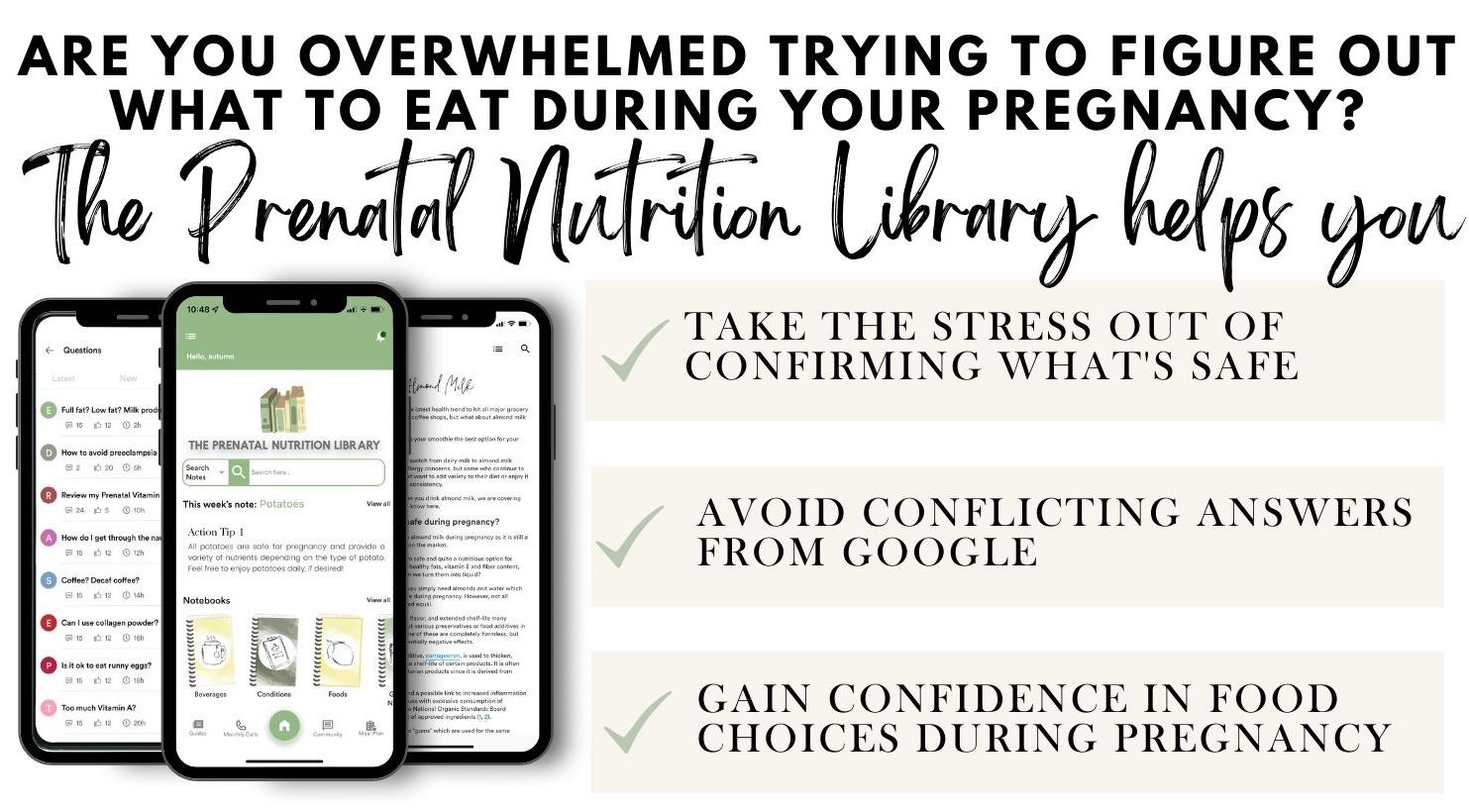Eating a variety of foods is very beneficial to our health during pregnancy. Your body needs more of many nutrients and electrolytes to support your growing baby. One important nutrient for pregnancy is potassium. Potassium plays a role in several important body processes. When you are deficient (significantly lacking) in potassium, a condition called hypokalemia, there is an increased risk for serious complications.
Potassium is an important mineral and electrolyte that helps with the balance of fluids in our cells. Potassium is also needed to send nerve impulses and help muscles contract. During pregnancy, adequate potassium, along with other electrolytes, may help relieve fluid retention and prevent leg cramping and restless legs. Electrolytes help to support our immune system and overall health.
There is not enough data to determine the recommended daily amount (RDA) of potassium for pregnancy. However, an adequate intake (AI) is set. The AI is 4,700 mg of potassium per day and even higher for breastfeeding.
During pregnancy, eating a balanced diet that includes potassium-rich foods is especially important to have enough potassium in the body. Consuming enough potassium-rich foods minimizes the chances of hypokalemia during pregnancy.
You should be aware of these signs and symptoms of low potassium during pregnancy.
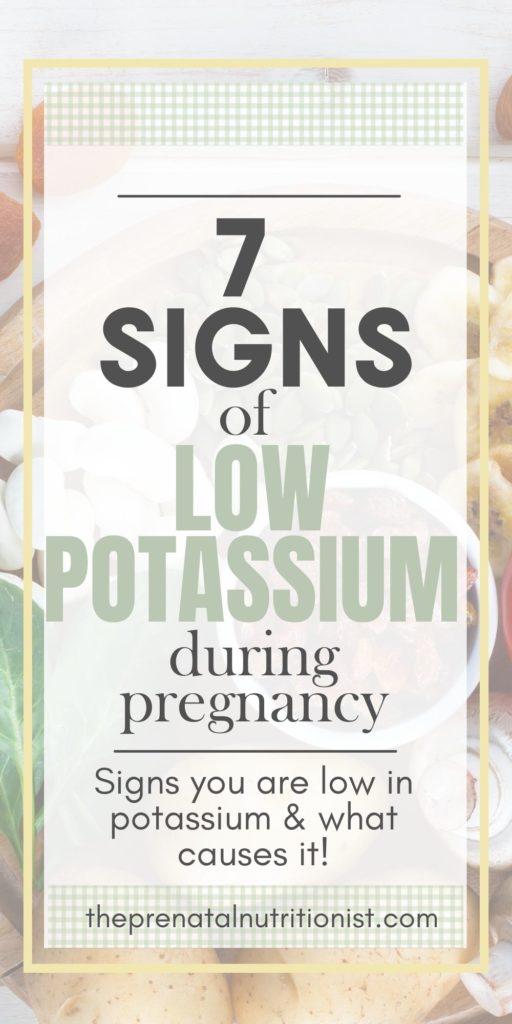
7 Signs Of Low Potassium During Pregnancy
- Constipation
- Fatigue
- Muscle weakness
- Muscle cramps
- Difficulty breathing or shortness of breath
- Numbness or tingling
- Irregular heartbeats or palpitations
- Confusion
What Could Cause Low Potassium In Pregnancy?
Morning Sickness
Severe morning sickness, specifically frequent bouts of nausea and vomiting, could lead to an imbalance of fluids and electrolytes. In addition, severe vomiting and inability to consume potassium-rich foods could cause low potassium.
Certain Medications
Some medications can also increase the risk of potassium deficiency during pregnancy. For example, diuretic medications often used to treat high blood pressure sometimes result in excess loss of fluids, contributing to low potassium levels. Additionally, laxatives and some antibiotics, like gentamicin and carbenicillin, could result in low potassium levels.
Inflammatory Bowel Diseases
People with Inflammatory Bowel Diseases, including Crohn’s Disease and Ulcerative Colitis, are at an increased risk for low potassium levels. Inflammatory Bowel Diseases impact the process of potassium secretion and overall electrolyte absorption and could contribute to low potassium levels or hypokalemia.
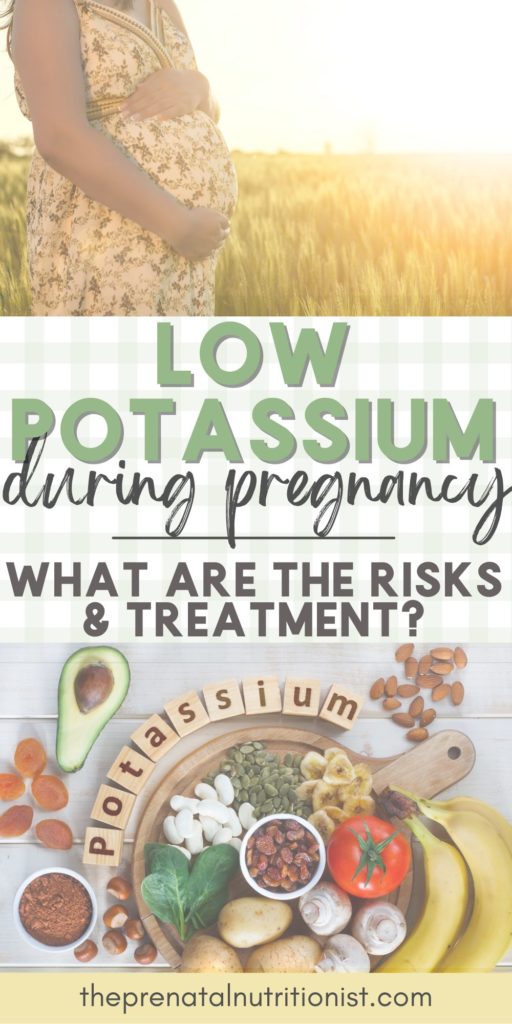
Low Potassium Pregnancy Risks
Fortunately, potassium deficiency (hypokalemia) is rare during pregnancy. However, it is serious when it does occur. The following health conditions have been associated with hypokalemia during pregnancy:
- Congestive heart failure
- Coronary artery disease
- Cushing’s syndrome
- Gestational hypertension
- Hyperemesis Gravidarum
Low Potassium In Pregnancy Treatment
Addressing Underlying Cause
The first step is working with your doctor or dietitian to identify the underlying cause of hypokalemia. Addressing those issues will hopefully resolve low potassium levels.
For example, hypokalemia caused by severe morning sickness or HG can be treated by further addressing and treating this root cause. Or if a specific medication causes hypokalemia, work with your doctor to find an alternative medicine if possible. If you are having symptoms of hypokalemia, contact your doctor.
Increasing Dietary Potassium Consumption
Mild hypokalemia can often be treated by increasing the intake of potassium-rich foods. In addition, consuming more potassium-rich foods is an effective treatment for some pregnant women with low potassium. Food is always the best solution to start with!
Potassium Supplements
Potassium supplements are not indicated for healthy individuals during pregnancy. Pregnant women diagnosed with hypokalemia should work with their healthcare team and do a blood test to check potassium level in your blood, to determine if a supplement is necessary in their particular situation. If potassium levels are too low, resulting in severe hypokalemia, intravenous administration of potassium might be needed.
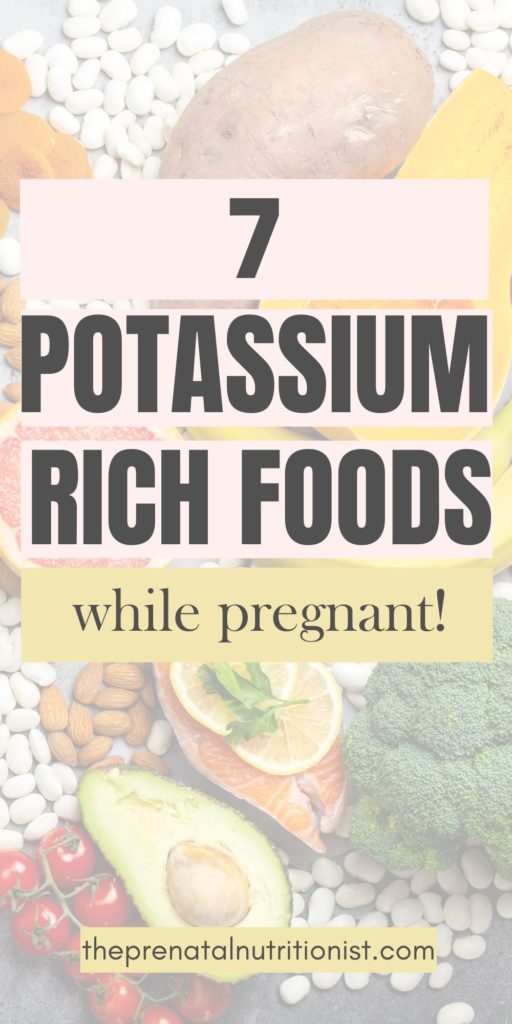
7 Potassium-Rich Foods for Pregnancy
Bananas
When you think about potassium-rich foods, you probably thought of bananas first. With 422 mg of potassium in a medium banana, they are among the best sources of potassium. While bananas are high in potassium, bananas are also rich in vitamin B6 and supply some vitamin C, magnesium, and fiber.
Bananas are an often well-tolerable food to provide relief for pregnant women during times of morning sickness, nausea, and food aversions.
Leafy Greens
Dark leafy greens are also a great source of potassium. There are about 483 mg of potassium in ½ cup of cooked Swiss chard and 445 mg of potassium per cup of cooked bok choy. A 3-cup serving of fresh, raw spinach provides about 501 mg of potassium.
Try blending fresh greens into some of these smoothies for pregnancy for a nutritional boost, or serve up cooked sautéed greens as an easy, nutritious side dish.
Acorn Squash
Acorn squash is one of the lesser-known potassium-rich foods. But, per the USDA, there is a whopping 896 mg of potassium in one cup of cooked, cubed acorn squash.
Acorn squash is also rich in vitamin A, B vitamins, and dietary fiber. Since acorn squash is rich in fiber, it’s a great complex carbohydrate choice for those with gestational diabetes.
Potatoes
Potatoes are fantastic sources of potassium. A medium-sized baked potato without skin has about 610 mg of potassium. You’ll get over 900 mg of potassium if you eat it with the skin. A medium to large sweet potato with skin has 450 mg or more potassium.
Potatoes also supply small to moderate amounts of folate, vitamin C, non-heme iron, and fiber, all of which play an essential role during pregnancy.
There are many ways to enjoy potatoes, including baked, mashed, or air-fried.
Lentils
Lentils are also a fantastic source of potassium. One cup of cooked lentils provides 731 mg of potassium. They also provide pregnant women folate, plant-based protein, fiber, and non-heme iron.
Lentils are delicious in soup, as a side dish, or mixed into salads.
Dried Fruit
Dried fruit is another somewhat unexpected source of potassium. For example, one dried prune offers 70 mg of potassium, while one small box (0.5 ounces) of raisins has about 105 mg of potassium.
Since dried fruit is a more concentrated source of sugar, it’s best to eat it in moderation and paired with a source of protein and healthy fat. Also, choose dried fruit that is free from added sugars.
Walnuts
You probably weren’t thinking about nuts when you heard potassium, but just one ounce of walnuts offers an impressive 125 mg of potassium. Peanuts, almonds, hazelnuts, brazil nuts, and cashews are other potassium-rich nuts to add to your grocery list.
Nuts are also rich in healthy fats and several other micronutrients. For example, walnuts contain folate, vitamin E, and vitamin B6, to name a few.
Add them to your salads, Greek yogurt bowl, or oatmeal to increase the nutrient content. Combining a variety of nuts and seeds into a trail mix also makes for an easy on-the-go snack.
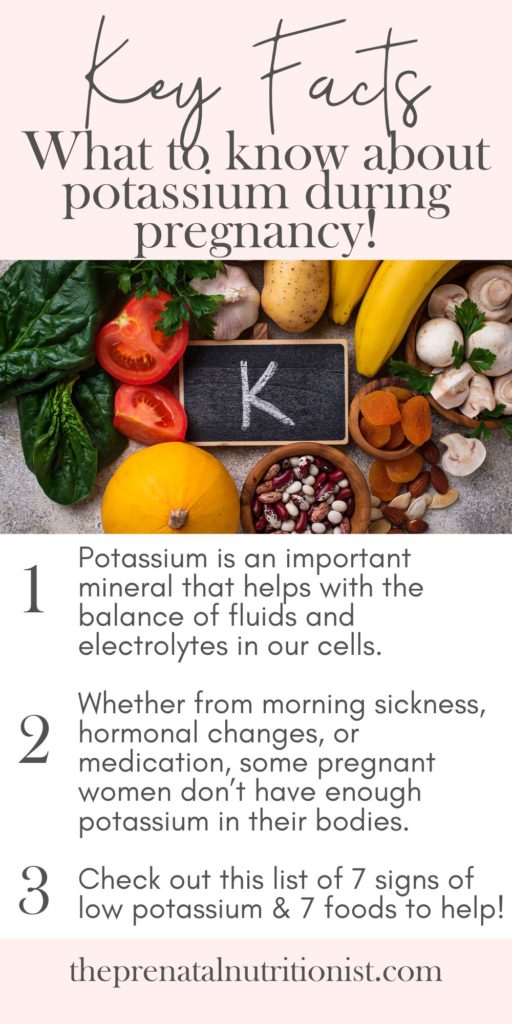
Low potassium in pregnancy, and its various complications, can be avoided by including plenty of food sources in your diet.
Some pregnant women have low levels of potassium, whether it’s due to severe morning sickness, medication, or Inflammatory Bowel Disease. A deficiency of potassium, called hypokalemia, can cause several health complications. Fortunately, focusing on potassium-rich foods is enough to make a significant difference for many women. Your doctor may recommend supplements, but that is on an individual basis.
On the blog, you can read more about nutritious foods to eat during pregnancy, like brown rice, barley, radishes, and more.
And to gain access to hundreds of guides on preconception and pregnancy nutrition topics, join The Prenatal Nutrition Library. It’s your home for the answers to all your frequently asked pregnancy nutrition questions, delicious and healthy trimester meal plans, and more! Check it out today!



